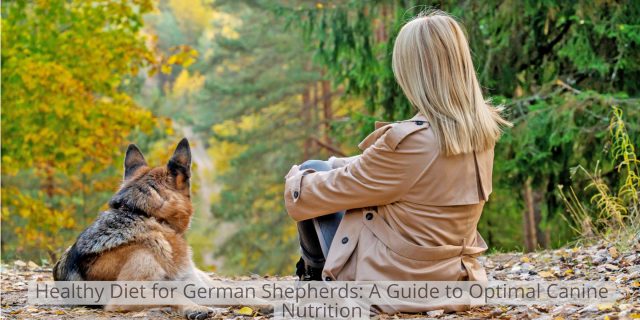Medically Reviewed by:
Name: Ezire Lilian Chinwe
Description: A highly motivated and licensed biomedical scientist with over 7 years of experience, dedicated to advancing healthcare through innovative research and analysis. Expertise includes genetics, microbiology, and immunology with a commitment to staying at the forefront of scientific advancements.
Healthy Diet for German Shepherds: A Guide to Optimal Canine Nutrition
In the world of canine companions, German Shepherds are renowned for their intelligence, loyalty, and versatility. These majestic dogs are known for their agility and strength, making them excellent working dogs and loving family pets. To ensure that your German Shepherd thrives in every aspect of life, it’s crucial to provide them with a healthy diet tailored to their specific needs. In this comprehensive guide, we will delve into the intricacies of crafting a balanced and nutritious diet for your beloved German Shepherd.

Understanding the Nutritional Needs of German Shepherds
Before we dive into the specifics of Healthy Diet for German Shepherds, it’s essential to grasp the unique nutritional requirements. These dogs have specific dietary needs due to their size, energy levels, and potential health concerns.
1. Protein Power: The Foundation of Their Diet
German Shepherds are active dogs, often engaged in various physical activities like herding and protection work. To support their muscles and overall health, a diet rich in high-quality animal protein is vital.
2. A Balanced Blend of Carbohydrates
While protein is essential, carbohydrates also play a crucial role in providing energy for your German Shepherd. Opt for complex carbohydrates like brown rice and sweet potatoes to maintain steady energy levels.
3. Healthy Fats for Shiny Coats and Sharp Minds
German Shepherds require a source of healthy fats, such as those found in fish and flax-seed, to maintain a lustrous coat and support brain function.
4. The Role of Vitamins and Minerals
Ensure that your German Shepherd’s diet includes a variety of fruits and vegetables to provide essential vitamins and minerals. These nutrients are vital for overall well-being.
Crafting the Perfect German Shepherd Meal Plan
Now that we understand their nutritional needs let’s create a sample meal plan that ensures your German Shepherd stays fit and healthy.
5. High-Quality Commercial Dog Food
Begin with a high-quality commercial dog food that meets the Association of American Feed Control Officials (AAFCO) standards. Look for options that list meat as the primary ingredient.
6. Protein-Rich Meat Sources
Supplement your dog’s diet with lean meats like chicken, turkey, and beef. These protein sources will support muscle development and overall health.
7. Healthy Carbohydrate Choices
Incorporate whole grains like brown rice or quinoa into your German Shepherd’s meals. These grains provide essential energy and dietary fiber.
8. Fruits and Veggies Galore
Include a variety of fruits and vegetables such as carrots, blueberries, and broccoli to provide a spectrum of vitamins and minerals.
9. Omega-3 Fatty Acids for Optimal Health
Add sources of omega-3 fatty acids like salmon or fish oil supplements to maintain a glossy coat and promote joint health.
10. Hydration is Key
Always ensure that your German Shepherd has access to fresh water. Proper hydration is essential for digestion and overall well-being.
Special Considerations for German Shepherds
German Shepherds are prone to certain health issues, and their diet can play a significant role in preventing or managing these conditions.
11. Joint Health
To support joint health, consider adding glucosamine supplements to their diet, especially as they age.
12. Weight Management
Maintaining a healthy weight is crucial for German Shepherds. Be mindful of portion control and regular exercise to prevent obesity.
13. Allergies
Some German Shepherds may have food allergies. Monitor for adverse reactions and consult your vet for allergy testing if necessary.
14. Dental Care
Incorporate dental treats or toys designed to promote oral health. Good dental hygiene is vital for overall well-being.
Conclusion
In conclusion, providing a Healthy Diet for German Shepherds is a fundamental aspect of responsible pet ownership. By understanding their specific nutritional needs and crafting a well-balanced meal plan, you can ensure that your loyal companion enjoys a long and vibrant life by your side.
Frequently Asked Questions (FAQs) Healthy Diet for German Shepherds
1. How often should I feed my German Shepherd?
- It’s typically recommended to feed adult German Shepherds twice a day, but consult your veterinarian for personalized advice.
2. Can I feed my German Shepherd homemade dog food?
- Yes, you can, but it’s essential to ensure it meets their nutritional requirements. Consult with a veterinarian or canine nutritionist for guidance.
3. Are there any foods that German Shepherds should avoid?
- Yes, some foods like chocolate, grapes, and onions are toxic to dogs and should be avoided at all costs.
4. How can I tell if my German Shepherd has food allergies?
- Watch for symptoms like itching, diarrhea, or vomiting. Consult your vet for a proper diagnosis and treatment.
5. Is it necessary to add supplements to my German Shepherd’s diet?
- It depends on their specific needs. Consult your veterinarian before adding any supplements to your dog’s diet.
In summary, providing your German Shepherd with a healthy diet tailored to their unique needs is a significant step in ensuring their well-being and longevity. By following the guidelines outlined in this article, you can keep your faithful companion happy and healthy for years to come. Remember Healthy Diet for German Shepherds.
Sources:
GSD Living gsd-living.com/diet/
PetCareRX www.petcarerx.com/article/healthy-eating-for-a-german-shepherd/506
World of Dogz worldofdogz.com/best-diet-for-german-shepherds/
Medically Reviewed by:
Name: Ezire Lilian Chinwe
Description: A highly motivated and licensed biomedical scientist with over 7 years of experience, dedicated to advancing healthcare through innovative research and analysis. Expertise includes genetics, microbiology, and immunology with a commitment to staying at the forefront of scientific advancements.









